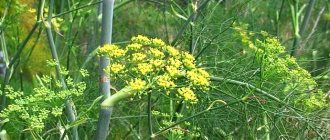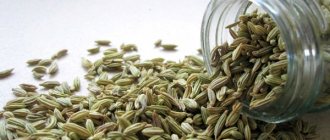Many parents are faced with the concept of colic in a newborn. Not only the child, but also the entire household suffers from this acute constant pain in the tummy, since it is very difficult to listen to the constant crying of a child. Parents sometimes resort to whatever means they can to calm their child. After all, it is very difficult to watch the torment of a small creature.
Children are all different, some are able to endure pain from infancy, others perceive any pain very intolerantly. Colic needs to be experienced, as it often goes away after three months of adaptation to the new world. During this period, the intestines will be colonized with bacteria, the child will stop overeating, which most provokes colic. Your task is not to treat, but to help yourself and your child reduce pain and survive this difficult period.
The benefits of fennel for a nursing mother
Fennel has a positive effect on all major systems of the body, improving well-being and giving strength to a nursing woman.
Infusions from the plant have been successfully used for many centuries as a general tonic after childbirth.
Fennel stimulates breast milk production
Fennel is a traditional “female” plant. Its use increases the production of sex hormones, including prolactin, the hormone responsible for the lactation process.
In addition, the plant has an antispasmodic effect, i.e. relaxes muscles, blood vessels and gland ducts, which has a beneficial effect on the flow of milk to the nipple area.
The tea has a pleasant taste and aroma that does not spoil the taste of milk. Fennel has a special, refined taste and aroma that will appeal to many nursing mothers and pleasantly diversifies the diet. When consuming this plant, the taste of breast milk does not change, and there are no problems with the feeding process.
Getting into breast milk, fennel helps the baby with colic
Eating fennel improves the health of not only the mother, but also her child. Through breast milk, a small amount of beneficial substances reaches the baby and successfully relieves colic. Such indirect use of an infusion from the seeds of the plant is a gentle and safe way to relieve an unpleasant symptom.
Babies whose mothers drink tea with fennel are less likely to experience colic.
Treats colds
The herb has both antimicrobial and antifungal properties. It successfully destroys microbes on the mucous membranes of the mouth, larynx, stomach and intestines. Reasonable consumption of fennel serves as a prevention against colds, flu and ARVI.
Fennel alleviates the symptoms of ongoing diseases
Rich in vitamins and microelements
The seeds of the plant contain many useful substances:
- vitamins A, C, PP, group B;
- minerals - calcium, iron, phosphorus, copper, manganese, molybdenum, magnesium and potassium;
- amino acids;
- fatty acid;
- essential oils and phytosterols.
Fennel tea perfectly supports and strengthens the weakened body of a nursing mother, in some cases replacing pharmacy vitamin complexes.
Has a mild sedative effect
Fennel drinks have a vasodilating property, which helps saturate the brain with oxygen and reduce headaches. In addition, dill water calms the nervous system and helps with insomnia, poor sleep, stress and increased excitability.
Fennel tea will help you calm down
Has a beneficial effect on the gastrointestinal tract
The antispasmodic, diuretic and carminative properties of the plant have a gentle effect on the gastrointestinal tract, normalizing their functioning.
The herb helps in the absorption of food, improves intestinal motility, promotes the removal of fluid from the body, and stimulates cellular metabolism.
Contraindications to drinking fennel tea and possible harm
Despite centuries-old recommendations and the naturalness of the product, nursing mothers should use the plant very carefully and with prior consultation with a doctor. Fennel contains potent substances that, in large dosages, negatively affect the body of both mother and child.
Improper use of fennel can harm the body
Side effects of the drink include:
- increased drowsiness;
- headache;
- increased likelihood of seizures and epileptic seizures;
- decreased blood sugar;
- decreased breast milk production with excessive consumption;
- allergic reactions (skin rash, redness, cough, difficulty breathing; in a child - diarrhea or constipation).
The main rule for drinking dill water is not to drink it constantly, but as a medicine, following the instructions of specialists. After use, carefully monitor the condition of both mother and baby.
How to drink tea correctly for a nursing woman
During the feeding period, new foods should be introduced into the diet with caution. Before you start drinking drinks with fennel, it is recommended to test it for allergic reactions. To do this, a nursing woman should drink no more than 50 ml (a quarter cup) of dill water. Then, for about 2 days, you should carefully monitor both mother and child.
If no negative or strange reactions occur after drinking tea, then you can gradually increase the amount of drink
It is best not to prepare tea for future use, but to prepare fresh tea 2-3 hours before meals. It is advisable to take the drink before meals or before feeding. If necessary, sweeten with sugar or honey if the baby is not allergic to them.
When consuming fennel as part of herbal teas, the possibility of side effects is reduced. Therefore, experts recommend not drinking fennel tea in its pure form. We also recommend reading about thyme during breastfeeding and about the properties of Ivan tea for women’s health.
Contraindications and rules of use
Main contraindications to consuming fennel:
- individual intolerance,
- epilepsy,
- problems with blood clotting,
- serious cardiovascular diseases.
Like any medicinal plant, fennel can cause allergies in infants. It may appear within 2-5 days after starting use. Warning signs:
- rash on the body
- hives,
- itching,
- increased colic,
- stool disorder.
You can minimize the risks of unpleasant consequences by following certain rules:
- Start giving your baby a drink with fennel no earlier than he is 7 days old.
- Coordinate treatment with your local pediatrician.
- For the first time, offer the baby ½ teaspoon of tea or decoction in the morning.
- If well tolerated, increase the amount daily by 2 times until the required dosage is achieved.
- For 5 days, do not introduce new products into the menu of the child or nursing mother in order to accurately monitor the absence of an allergy to fennel.
At the slightest suspicion of hypersensitivity to the plant, you should stop using it and consult a doctor. In case of an allergic reaction, antihistamines may be required.
What is the best way to offer a drink to a child? It can be mixed with expressed breast milk or baby food. With breastfed babies, it is advisable to use not a bottle, but a small spoon or a syringe without a needle.
Does fennel tea for nursing mothers help increase breast milk production and relieve colic?
There are many folk recipes that help get rid of tummy problems in a baby, among them is tea with fennel for nursing mothers against colic. Thanks to the beneficial properties of the plant, it quickly relieves the baby of pain and has virtually no restrictions on its use. Today we will talk about the healing properties of the plant, its mechanism of operation and rules of use during lactation.
Excellent humana tea with fennel
For many years, people have used fennel and fennel teas to relieve cramps, colic, and other digestive problems. Humana tea for a newborn baby becomes a faithful assistant immediately after birth or from the moment colic begins to occur. Humana fennel tea was created specifically to solve such problems, and it can also be used to prevent dysbiosis, which has recently increasingly worried newborn children.
This tea contains maltodextrin and lactose, and they are responsible for the normal development of bifidobacteria. In addition, humana tea, which contains fennel, is very rich in vitamins and nutrients, which is especially valuable for a newborn. It is worth noting that fennel can be taken in any form and it will bring great benefits not only to the body of a newborn baby, but also to an adult.
We suggest you familiarize yourself with: Nasal drops made from onion and honey
Beneficial properties of fennel for women during breastfeeding
Fennel is a plant close in family to dill. Due to its rich composition, it has been used in folk medicine and cooking since ancient times. You can use all parts of the plant from root to seeds, in fresh and dried form, and it is allowed to consume the plant both raw and after heat treatment.
Tea containing fennel helps relieve colic in babies and increases lactation in mothers.
Fennel is a storehouse of nutrients. It contains B vitamins, vitamin C, A, E. In addition, the product is rich in calcium, potassium, iron, phosphorus and other microelements. The plant is rich in essential oils, antioxidants, amino acids, etc.
Thanks to its active composition, fennel is beneficial for all organs and systems of the body:
- Improves the functioning of the immune system.
- Has an anti-inflammatory effect.
- Tea made from fennel fruits and seeds helps with increased gas formation.
- Normalizes metabolism.
- Improves the removal of sputum in diseases of the respiratory system.
- Helps get rid of helminths.
- Removes toxins from the body.
- Strengthens the walls of blood vessels.
- Enriches the blood with oxygen, prevents the development of anemia in a nursing woman.
- Has a diuretic effect.
- Reduces weight, reduces appetite.
- Has a beneficial effect on hair.
- Normalizes hormone levels and helps restore the menstrual cycle.
- Reduces the symptoms of menopause.
- Has a good effect on the nervous system.
- Fennel oil helps get rid of fungi.
Positive aspects of the drug
- Removes spasm, due to which gases are calmly removed from the body;
- It has a diuretic effect, thereby promoting the removal of all harmful substances from the body;
- Helps dilate blood vessels and even intestinal walls, as a result of these actions pressure drops;
- Has a beneficial effect on the heart;
- Has an anti-inflammatory effect;
- Helps with coughs, promotes sputum production;
- Choleretic;
- Carrying;
- Helps increase appetite.
How often and when is it forbidden to give dill water to a child? When, in addition to colic, you observe more serious symptoms, diarrhea, for example, severe bloating, etc. Then the child must be examined by a doctor, because there are no trifles here, the main thing is to see changes in the child’s mood and condition in time, because there are different diseases and their treatment also different.
Fennel is not allergenic and has no contraindications, but it is necessary to follow the dose, otherwise you can overdo it and get the opposite effect. Everyone knows that a large dose of dill can cause bloating. And fennel is several times stronger than dill.
Possible harm and contraindications
All medicinal plants have contraindications for use. Sweet dill is no exception. It is prohibited to use in case of individual intolerance or allergies. The use of fennel by pregnant women is prohibited, since anethole, which is in the composition, can significantly increase the tone of the uterus. The plant can provoke tachycardia, so use is not recommended for heart problems.
Fennel can cause side effects in both mother and baby, so you should carefully monitor the reaction. The plant can cause allergies, especially in infants. In infants, taking fennel can cause tachycardia, excessive relaxation and lethargy.
Does fennel really increase lactation?
Fennel is known for its beneficial effect on lactation. It is also called dill water or sweet dill. This is not just popular opinion. Recently, through scientific research, it was found that the plant actually affects the amount of milk produced. Fennel affects estrogen levels in the body. It is he who is responsible for milk production. Thanks to the use of the product, natural improvement of lactation is stimulated. In addition, the nutritional value of milk increases. The effect may not be noticeable to everyone, and there is a possibility that the medicine may not work for some women.
Doctor Komarovsky's opinion
Dr. Komarovsky claims that increased gas formation in infants is a natural process that is not dangerous for the child. Using herbs will only help the psychological state of the mother, because she is doing something, and in fact the effectiveness is very small.
Does fennel tea help nursing mothers against colic in babies?
Fennel tea is recommended to be used to treat colic in babies. It can be used directly by giving it to the baby as a tea or drinking by the mother. According to WHO recommendations, during breastfeeding, a child should not be given anything other than mother’s milk until 6 months of age. During breastfeeding, dill can be given to a child from 1 month. But you should not self-medicate. Before use, you should consult your doctor.
If the mother drinks fennel drinks herself, it is allowed from birth. But it is better to postpone use until the baby is 2 weeks old. Women note that this method, in their opinion, is safer at an early age and quite effective.
Reviews
I gave my baby fennel tea several times. I think it helped. She tucked her legs in less and cried. I recommend.
How to brew and drink fennel correctly to increase lactation and for colic?
Despite the fact that fennel is a healthy and safe plant, before using it for breastfeeding and for colic, it is necessary to check for an allergic reaction. It is not recommended to give the medicine directly to the baby for the first time. It is allowed to start using the medicine 2 weeks after birth. A nursing woman needs to drink about a quarter to half a glass of the product. If negative changes in the child’s behavior have not been noticed within two days, you can continue to drink the drink or start giving it to your baby. Many people are interested in how often to drink the decoction and in what quantity. The maximum dose for mother is 1 glass of fennel tea per day, which is recommended to be divided into 2-3 doses.
Medicines containing fennel are prohibited during breastfeeding, as they contain a high content of essential oil. This can adversely affect the weakened body of a woman who has just given birth.
If fennel is used to treat tummy problems in a baby, you should definitely consult a doctor before starting the course. The recommended time to start giving dill water to a child is 1 month, but sometimes it is permissible to use it from the second week.
The first time you need to give your baby ½ teaspoon of the drink and monitor the reaction. Usually negative consequences appear in the first day, sometimes after a week. Therefore, you should pay attention to all the baby’s reactions. Over time, the dosage can be increased. For a one-month-old baby, the recommended dose is up to 6 teaspoons of decoction. Always give freshly prepared solution. Do not store it for several days.
If you notice signs of an allergy, stop treatment immediately. Mild symptoms will go away on their own. If symptoms are pronounced or persist for a long time, you should consult a doctor. He will prescribe antihistamines.
In bags
If you don’t want to bother with preparing fennel, you can buy ready-made preparations for mothers and babies at the pharmacy. Most often they are presented in the form of tea in filter bags, but there are also ready-made solutions and powdered teas.
One of the most famous brands of dill tea bags on the Russian market is Bebivita. To prepare it, pour 1 cup of boiling water over 1 tea bag and let stand for up to 20 minutes. Give to your baby according to the instructions on the package.
The drug "Plantex" is widely popular. It also comes in the form of tea bags. It contains: fennel fruits and oil, lactose, fragrance and glucose. To prepare, brew the bag in half a glass of milk or boiling water. Divide the resulting solution into 3 doses.
An equally well-known manufacturer of tea for infants is Babushkino Lukoshko. It contains fennel, nettle, cumin, clover, lemon balm, and anise for lactation. Brew it as you would regular tea and administer according to the manufacturer's instructions or your doctor's recommendation.
Pharmacy drugs
Several preparations are made based on fennel and are sold in pharmacies and specialized baby food stores. The most popular of them:
- "Plantex" - granules in bags containing fennel seed extract and essential oil. The substance from 1 sachet should be dissolved in 100 ml of water. The drug contains lactose, so it is contraindicated in children with lactose intolerance.
- “Bebivita” is tea in filter bags consisting of dried fennel seeds. The product does not contain additives. It is necessary to pour 1 sachet with 200 ml of boiling water and leave for 10-15 minutes.
- “Hipp” is a granulated tea made from fennel extract. The drug contains dextrose (grape sugar). Dissolve 1 teaspoon of granules in 200 ml of water; no need to infuse.
Pharmacies sell ready-made “dill water”. Before using it, you should study the instructions. The concentration of essential oil in products from different manufacturers varies, and this affects the dosage.
Fennel for newborns is an effective and safe remedy for relieving colic. When using it, it is important to follow the dosage prescribed by the doctor and monitor the condition of the baby in order to promptly notice an allergic reaction. In addition, fennel infusion can be used externally to solve dermatological and neurological problems.
Recipes
Classic colic tea with fennel
Compound:
- Fennel seeds - 2 tsp.
- Boiling water - 1 glass.
Preparation : Pour boiling water over the seeds and let it brew for 2 hours.
Application : Drink 2 tbsp. l. before meals. You can add sugar.
Tea with milk
Compound:
- Fennel seed powder - 1 tbsp. l.
- Milk - 1 glass. (Can be replaced with kefir).
- Salt - a pinch.
- Nutmeg - a pinch.
Preparation:
- Mix fennel and warm milk.
- Add nutmeg and salt.
- Let it brew.
- Strain and store in a cool place.
Application : Drink 100 ml of the drink before breakfast.
Sour cream and fennel sauce
Compound:
- Sour cream - 1 glass.
- Fennel powder - 1 tbsp. l.
Preparation:
- Mix the ingredients.
- Place in a preheated oven for an hour.
Application : Eat the sauce warm, preferably before bed.
Fennel and fenugreek cocktail
Compound:
- Fennel (powder) – 20 g.
- Fenugreek (powder) – 20 g.
- Dill (powder) - 20 g.
- Boiling water - 1 glass.
Preparation:
- Mix the ingredients and pour boiling water.
- Leave in a thermos for several hours.
Application : Dilute a cold drink from a thermos with warm water in equal quantities and drink a glass 30 minutes before feeding in the morning and evening.
Lactation tea with fennel and anise
Compound:
- Anise - 0.5 tsp.
- Dill - 0.5 tsp.
- Fennel - 0.5 tsp.
- Cumin - 0.5 tsp.
- Water - 0.5 l.
Preparation:
- Grind the herb seeds and mix.
- Add half a liter of boiling water and let stand for 30 minutes.
Application : Drink 3 tbsp. l. a quarter of an hour before meals up to 6 times a day.
Herbal tea made from lemon balm, thyme and fennel
This tea is used as a complex treatment for infants. It has soothing, anti-inflammatory properties. In addition, it helps with baby colic.
Compound:
- Melissa - 1 tsp.
- Fennel - 1 tsp.
- Thyme - 1 tsp.
- Boiling water - 1 glass.
Preparation:
- Mix herbal powders.
- Pour boiling water over it.
- Let stand for 30 minutes.
Application : Drink 1 glass of the drink warm in the evening before bed.
Drink Recipes
Tea
Children's fennel infusion (tea) is very simple to prepare. You need to take the seeds (2-3 g), crush them in a mortar and pour boiling water (200 ml). After 30-60 minutes, the drink should be filtered through a strainer or gauze and a little boiled water at room temperature should be added to it to again make 200 ml.
Decoction
A decoction is made from the fruits (roots) of fennel. 5 g of raw material should be finely chopped, pour 200 ml of boiling water, boil for 2 minutes and leave for 10 minutes. Then the drink needs to be strained and cooled to a comfortable temperature.
Infusion
The above-ground parts of the plant (herb) are also suitable for preparing an infusion. They can be brewed dry or fresh. 1 spoon of chopped herbs should be poured into 100 ml of boiling water, left for 1 hour and filtered.
Dill water
Fennel is most effective for newborns in the form of “dill water”. Despite its name, this water is made from essential oil obtained by distilling fennel seeds. In Soviet times, it could be purchased in almost all pharmacies, but now it has become less accessible. Water is produced under various brands, but is not cheap.
“Dill water” is prepared as follows: 0.05 g of fennel essential oil is dissolved in 1 liter of boiled (cooled) water. This medicine can be stored for about 30 days in the refrigerator, shaking and warming slightly before use.
Fennel tea HIPP during breastfeeding: instructions for newborns and nursing mothers
Fennel is a miracle remedy that is loved by mothers all over the world. It helps, without harm to the newborn’s body, to overcome the worst infant nightmare - colic. What baby doesn't suffer from colic, especially at night? Anguish crying, kicking of legs and other manifestations of wild suffering of a toddler force mothers to seek advice from a pediatrician. A newborn cannot be treated with most of the dyspepsia remedies offered by the modern pharmaceutical industry. It is allowed only natural ingredients, and even then in minimal doses. How to alleviate tummy problems? Tea with fennel comes to the rescue, previously it was replaced by ordinary dill water.
Treatment rules
Fennel is considered a safe product for babies if consumed in a reasonable dosage. The only possible side effect is allergies in the form of rash and itching. Giving children's infusion or decoction must be done very carefully.
If you have tummy problems, fennel tea for newborns can be offered starting from the second week of life, after consulting with your pediatrician. On the first day, you are allowed to give the baby 0.5 teaspoon. If an allergy does not manifest itself, the dosage can be increased to 3 teaspoons per day: 1 spoon before each feeding. When the baby is one month old, the volume of infusion can be increased to 6 teaspoons per day.
An allergy to fennel sometimes does not appear immediately, but after 4-5 days of use. During this period, it is better for a nursing mother not to introduce new foods into her diet so that the baby’s reaction can be clearly monitored.
If negative consequences occur, you should immediately stop giving the baby the solution. If the allergy bothers him very much and does not go away for a long time, he may need to use antihistamines prescribed by a doctor.
Another important point in using fennel drinks is that it is better to prepare them immediately before use (the exception is “dill water”). The remaining baby tea can be drunk by the mother. This will have a beneficial effect on lactation and the functioning of its gastrointestinal tract.
Benefits of fennel for babies
What are the beneficial properties of fennel tea for newborns:
- eliminates colic and removes excess gases without gas tubes and enemas (see also: how to correctly insert a gas tube into a newborn?);
- relieves spasm of intestinal smooth muscles;
- improves intestinal motility and food digestion;
- strengthens the nervous system and immunity;
- activates the lactation of a nursing mother.
Tea is indicated not only for children, but also for nursing mothers - it improves lactation
Cause of colic
Of course, before you begin to treat, you first need to understand the cause of the disease. What causes colic? Of course, due to the gases that form in the intestines. What provokes them? Among the common causes of gas formation in the intestines are:
- The child’s digestive system is also imperfect and immature. It takes a long time to assimilate or does not assimilate food, which is why active processes of fermentation and gas formation begin, which the system itself is unable to cope with.
- When eating, the child swallows a lot of air. Air mixed with milk causes colic.
- Mom's poor diet, sweet, fatty, spicy foods, cabbage, peas and many other vegetables cause gas.
- Binge eating.
With regular use of a remedy such as dill water for newborns, all digestive processes are normalized. Colic goes away thanks to the positive relaxing effect of fennel on the intestinal muscles. By relieving the spasms, the pain is relieved and the child calms down.
Carefully!
Any product, including those of natural origin, can cause allergies and side effects. Fennel is often very well tolerated, but there are times when drinking it is not recommended:
- in case of allergy to dill or fennel;
- for epilepsy.
Everything is clear about the epi status; it is impossible to miss it in a baby. How can you determine if a baby has allergies?
If everything is fine, feel free to give your baby tea with fennel. In any case, consult your pediatrician before treating your baby.
Recipes for brewing tea at home
How to properly prepare fennel for newborns? If you brew the plant yourself, then use a few simple recipes from our article. This will take a little time and effort on your part, but homemade herbal teas are usually more effective than pre-made ones from the pharmacy or supermarket.
Fruit tea
Chop natural fennel fruits with a knife, rinse and dry them before doing this. The proportion is a teaspoon of fruit per glass of boiling water. Pour the fruits into an enamel bowl and let them stand for 30-40 minutes. Don't forget to strain the infusion before serving it to your child. Give no more than 15 ml at a time, brew a new portion each time so that no pathogenic microbes accidentally get into the drink left from the last time.
Green tea
The recipe is similar. Pour boiling water over fresh or dried herbs in a ratio of 1 tablespoon per 300 ml. Leave to infuse for half an hour. Strain before drinking and wait until it cools down. You can add it to breast milk or give it in pure form up to 50 ml per day. Do not leave the brewed drink for later.
Tea from seeds
Grind a teaspoon of seeds in a coffee grinder or grind them yourself in a mortar, it’s easy. Pour boiling water over it and leave to steep. Give this fennel tea a teaspoon before each feeding.
Natural fennel tea gives quick positive results. You can buy fennel at a pharmacy, at the market, or at a medicinal herbal store. Don't get confused! Difference between fennel and dill:
- The smell of fennel is pleasant, anise-like, and the taste is spicy;
- dill has a rather pungent aroma, not always pleasant for babies;
- fennel rhizome is much larger and juicier;
- Dill stems are much longer.
Fennel is very similar to dill, but with due care they can always be distinguished
Store-bought fennel teas
Modern mothers prefer to use ready-made fennel tea for newborns. It can be bought in almost any supermarket and pharmacy where children's products and food are available. The most popular fennel tea is Plantex. This is not only a salvation for newborns, but also fennel tea for nursing mothers. It copes well with colic; you should add a little drink to breast milk or water according to the instructions.
No less popular are teas from European companies - for example, the granulated fennel drink "Hipp". This German company has been producing children's products that are popular all over the world for more than 100 years. Fennel drink "Hipp", consisting of granules, is easy to measure. As the instructions say, an open jar can be stored for no more than 3 months.
To prepare, pour a teaspoon of “hipp” tea with 100 ml of boiled warm water (more details in the article: is there tea for milk lactation?). The company also produces tea in bags, so you can choose a product that is more convenient for you. Do not use boiling water under any circumstances; there is no need to strain the solution. The drink is immediately ready to drink, which greatly simplifies the life of a young mother. Pour some tea into a bottle and go for a walk - this drink perfectly quenches your thirst, it is healthy and tasty.
Hipp children's tea contains only natural ingredients, and is also very easy to prepare.
Fennel tea for newborns is also popular in the form of filter bags - this Ukrainian company has long been in demand among mothers in the post-Soviet space. It produces budget and high-quality baby food, herbal teas, and water.
You can often find “Dill Water” on the shelves, but it often contains fennel. Regular dill is now rarely used for medicinal purposes.
Types of teas
Many people’s “relative” of dill grows in their garden beds. Housewives collect ripe fennel seeds so that they can prepare a healing infusion at any time. But most city residents do not have this opportunity, so they are forced to buy raw materials for tea. Some will make a purchase from a grandmother-herbalist selling at the market, others will go to a pharmacy or store where the spicy crop is sold in civilized packaging.
These teas are more preferable for children, since the raw materials have undergone all the necessary processing and are supplemented with useful components, taking into account the child’s body. Among them there are 2 most popular products.
- Hipp tea is a drink with a pleasant taste and smell, made from varieties of culture specially grown for this purpose. This plant contains much less estragole than garden varieties, which makes the product more acceptable for newborns. But along with fennel, hipp contains dextrose, which is necessary for the baby for normal development.
- Humana Children's Herbal Tea also contains herbal ingredients. Compared to hipp, this product also contains lactose and maltodextrin, which can improve the intestinal microflora. So Humana is also an excellent remedy for dysbiosis.
Fennel tea for newborns hipp
You can also look for some other tea composition on sale, similar to hipp. In this case, you should pay attention to the description of the composition - it should not contain any dyes, preservatives, or sucrose. You can store opened packaging at home for no more than 3 months.
We suggest you read: How to buy cellular polycarbonate correctly











